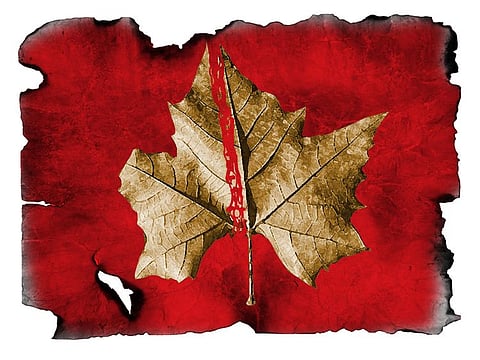Kashmir dispute: A timeline through the years
On August 5, India struck down Article 370 removing last vestiges of the region's autonomy

Also In This Package
Kashmir dispute emerged in 1947 immediately after the Subcontinent got independence from the British rule and India and Pakistan were born as two independent nations.
In September 1947, Dogra forces aided by RSS militia and the troops from the neighbouring state of Patiala turned the Jammu city and its peripheries into a killing field in a highly organised pogrom that left more than two hundred thousand Muslims dead and an equal number of them displaced.
Meanwhile Muslim rebels create a free state in Poonch area of J&K bordering the newly born Pakistan and called it Azad Jammu and Kashmir (AJK). Rebels defeat the Dogra forces in the Gilgit Baltistan province.
This was followed by tribal militia from Pakistan entering Kashmir to fight the Dogra forces. The monarch of J&K Maharaja Hari Singh decided to flee and approached India for help.
On October 27, Maharaja Hari Singh signed the accession treaty, a day after the Indian forces landed in Srinagar. India’s arrival in Kashmir drew Pakistan into it and the first of the four full-fledged Indo-Pak wars broke out.
A disputed territory
By the mid-1948, as the war seemed to be going nowhere, Indian prime minister Jawaharlal Nehru went to the United Nations and J&K got recognised as a disputed territory.
With immediate effect, UN Security Council passed a resolution recommending ceasefire, withdrawal of Indian and Pakistani troops and a plebiscite under international watch with minimal presence of Indian military.
As the ceasefire was declared under the UN aegis in 1949, India held two-thirds of the state while the rest of it remained under Pakistani control.
Article 370 of the Indian Constitution gave special status to J&K after the state was declared as part of India through Article 1 of the Indian Constitution.
Elections were held in 1951 which the National Conference won with a clean sweep and Sheikh Abdullah was appointed as the prime minister.
The Sheikh is dismissed
In August 1953, Sheikh Abdullah was deposed as prime minister and arrested on alleged charges of hobnobbing with foreign powers to create an independent J&K. His deputy Bakhshi Ghulam Mohammad was put in his place as the prime minister.
In 1955, India passed a Presidential Order through Article 370 that gave the Centre more powers than what the Instrument of Accession granted it.
In August 1965, as Pakistan sent infiltrators into Kashmir, the second Indo-Pak war erupted ending in a ceasefire on September 23. India immediately abolished the title of ‘Prime Minister’ in the state and replaced it with ‘Chief Minister’.
In 1971, India and Pakistan fought their third war that led to the fall of East Pakistan and the birth of Bangladesh.
Plebisite Front dissolved
In 1974, Sheikh Abdullah gave up on his demand of self-determination and dissolved the Plebiscite Front.
In 1975 Sheikh Abdullah became the chief minister of J&K through transfer of power under Indira-Abdullah accord.
In 1977, Sheikh Abdullah again became the CM after elections were held in the state which the National Conference won with a thumping majority.
In 1984, independent Kashmir votary and the prominent rebel leader Maqbool Bhat was hanged in Tihar Jail. Bhat was arrested in 1976.
In 1987, opposition parties formed an alliance against National Conference. Massive rigging results in a big win for NC and a widespread arrest of anti-NC voices including polling agents like Yasin Malik who was to become a prominent armed rebel leader a couple of years later.
As the government started crushing the dissent, many youths crossed over to Pak-administered for arms training.
Hurriyat Conference is formed
In 1993, All Parties Hurriyat Conference, a conglomerate of various pro-resistance political parties was formed.
In 1996, New Delhi held elections in the state with barely any public participation and National Conference was declared the winner with Farooq Abdullah as the chief minister.
In 1999, 4th Indo-Pak war broke out in Kargil sector after Pakistan captured positions earlier held by India. Pakistan vacated many of the positions under international pressure.
In 2006, Pakistani President Pervez Musharraf floated the four-point formula on Kashmir that included self governance for the residents of J&K on both sides of LOC, free cross-LOC movement for the residents of the disputed territory on either side, phased troop withdrawal and a joint Indo-Pak mechanism to create an atmosphere for a permanent resolution.
The plan was endorsed by Mirwaiz led Hurriyat Conference but was opposed tooth and nail by Syed Ali Shah Geelani, chairman of his faction of Hurriyat.
Massive civilian uprisings
In 2008, 2009 and 2010 there were three massive civilian uprisings against India that led to the death of hundreds of Kashmiris at the hands of security forces.
In 2015 PDP which fought the elections on the anti-BJP plank formed a coalition government with the same party. This was for the first time that a pro-Hindutva party formed government in J&K and unarguably the first step toward the abrogation of Article 370 and 35-A.
In 2016, forces killed Burhan Wani, a poster boy of the armed resistance in Kashmir that plunged the valley into a strict curfew that lasted for months after dozens of protesters were killed.
In June 2018, BJP pulled out of the coalition government it had formed with PDP and in November, the governor dissolved the state assembly.
In February 2019, a suicide bomber attacked a paramilitary convoy in South Kashmir killing more than forty personnel. In response, Indian jets dropped bombs inside Pakistani territory. Pakistan responded the very next day and downed at least one IAF jet and captured a fighter pilot.
On August 5, Government of India struck down Articles 370 and 35-A, removing with it the last vestiges of Kashmir’s autonomy.









